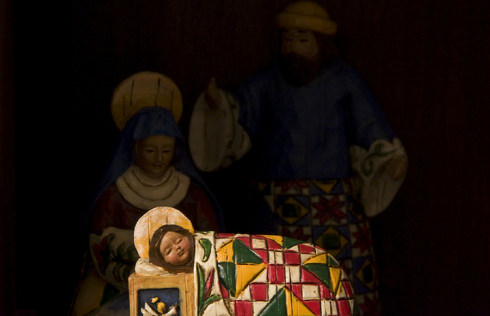 Celebrating Christmas in different parts of the world can be an interesting experience. One year, I was visiting my sister in Dubai. It was an amazing experience to visit bright shopping malls, covered in tinsel and other non-religious festive decorations, playing non-religious Christmas tunes, with not a Christian symbol in sight. The celebration was there, and there was a significant warmth to it. But it had become something very different in the majority Muslim culture - Xmas, or Christmas without Christ.
Celebrating Christmas in different parts of the world can be an interesting experience. One year, I was visiting my sister in Dubai. It was an amazing experience to visit bright shopping malls, covered in tinsel and other non-religious festive decorations, playing non-religious Christmas tunes, with not a Christian symbol in sight. The celebration was there, and there was a significant warmth to it. But it had become something very different in the majority Muslim culture - Xmas, or Christmas without Christ.
I realised, on subsequent Christmases at home, that Christmas here has become something different too. The main organisations that carry the Christmas message in the public square are no longer the churches, but the shops. For them, Christmas is the biggest business opportunity of the year. It's a time to encourage people to spend big. They might be spending on themselves or on their loved ones, but the important part is the spending.
Every year at Christmas there seems to be a debate about how much Christian symbolism should be on display in our public spaces. On one side are those who still see Christmas as a Christian holiday, and want the central story of the feast day - the birth of Christ - to be acknowledged. On the other side are those who don't hold religious beliefs - or hold the beliefs of other religions - but who still want to celebrate a feast of warmth and giving with their loved ones.
In an increasingly secularised society, it's not so much malice that allows Christian symbols to be lost at Christmas as good business sense. Anything that might alienate one group or another - such as something overtly religious - is bad for business.
But whether they are celebrating Christmas as a religious festival, or just a public secular celebration, people aren't stupid - they have their own reasons for wanting to purchase presents for their family, and spend time with them on Christmas day. There's still an undercurrent of love at Christmas, a celebration of what Christ symbolised when he entered into the world. A lot of people who celebrate Christmas might not be willing to name it, but they're living it anyway, and in a way that's something important.
Personally, I don't mind when commercial enterprises reject Christian symbols in their decorations. The commercial reality of Christmas is a long way from what Christ wanted. To me, it's not all that important that Christ is present in our shopping centres or other public space at Christmas. What's more important is that Christ is present in people's homes and in their relationships with loved ones.
In the Christmas edition of Australian Catholics magazine, I interviewed celebrity chef Julie Goodwin. Her family has a Christmas tradition where one seat at the table is set aside for Jesus - to remember in particular those we love who aren't with us anymore, for the homeless, the soldiers and anyone who doesn't have some place to be.
It's these sorts of traditions that help keep the spirit of Christmas alive in our homes. Just as importantly, it's these sorts of traditions that people of other beliefs can also grasp and share. Rather than campaign about getting our religious symbols into places where they aren't wanted, and frankly don't belong, let's make our Christmas campaign about encouraging people to expand the love that's present in their family celebrations outwards, to encompass others in the world that need that love, by keeping a spare seat at the table on Christmas day.
In other words, rather than trying to change Xmas back into Christmas, let's work on making celebrations of Xmas places where Christ can still be present, even if people don't recognise that it's him.
Michael McVeigh is the editor of Australian Catholics magazine, and senior editor at Jesuit Communications Australia.
For more on bringing Christ to the dinner table, check out this great video, 'Jesus the foodie'
The Christmas edition of Australian Catholics magazine focuses on the theme, 'Food, glorious food'. Read stories and explore related resources at www.australiancatholics.com.au.
Photo: Nativity Set; Flickr